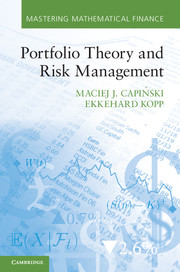1 - Risk and return
Published online by Cambridge University Press: 05 May 2015
Summary
Financial investors base their activity on the expectation that their investment will increase over time, leading to an increase in wealth. Over a fixed time period, the investor seeks to maximise the return on the investment, that is, the increase in asset value as a proportion of the initial investment. The final values of most assets (other than loans at a fixed rate of interest) are uncertain, so that the returns on these investments need to be expressed in terms of random variables. To estimate the return on such an asset by a single number it is natural to use the expected value of the return, which averages the returns over all possible outcomes.
Our uncertainty about future market behaviour finds expression in the second key concept in finance: risk. Assets such as stocks, forward contracts and options are risky because we cannot predict their future values with certainty. Assets whose possible final values are more ‘widely spread’ are naturally seen as entailing greater risk. Thus our initial attempt to measure the riskiness of a random variable will measure the spread of the return, which rational investors will seek to minimise while maximising their return.
In brief, return reflects the efficiency of an investment, risk is concerned with uncertainty. The balance between these two is at the heart of portfolio theory, which seeks to find optimal allocations of the investor’s initial wealth among the available assets: maximising return at a given level of risk and minimising risk at a given level of expected return.
- Type
- Chapter
- Information
- Portfolio Theory and Risk Management , pp. 1 - 10Publisher: Cambridge University PressPrint publication year: 2014



